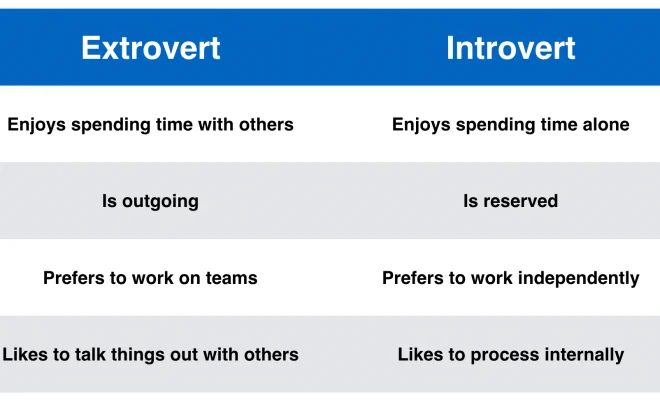Introvert vs. extrovert: What they mean and why it matters

In today’s fast-paced and interconnected world, understanding one’s own personality type and relating to others is more important than ever. One of the key distinctions in human personality is the difference between introverts and extroverts. But what do these terms mean, and why do they matter?
What They Mean
Introvert and extrovert are terms originally coined by psychologist Carl Jung to describe different ways individuals gain energy and interact with their surroundings. While on a surface level, these terms may seem synonymous with being shy or outgoing, in reality, they represent so much more.
Introverts are individuals who gain energy from spending time alone or in smaller groups of people. They tend to think and reflect deeply on their experiences and feel drained after too much social interaction. Introverted individuals often possess strong abilities in self-awareness, creativity, critical thinking, and empathy.
On the other hand, extroverts are those who feel energized around others and enjoy larger social gatherings. They tend to be more action-oriented than introverts, engaging actively in their environment without being overly introspective. While extroverted individuals can be great communicators, they might also struggle with impulsive behaviors or a lack of focus.
It is vital to remember that introversion and extroversion exist on a spectrum, with very few people falling at either extreme. Most individuals possess traits of both categories to varying degrees.
Why It Matters
Understanding whether you lean more towards introversion or extroversion has significant implications for individual well-being and interpersonal relationships.
For one’s own well-being, recognizing your preferences can help you manage stress levels more effectively. For example, if you know that you are an introvert who needs downtime after social events, you can make it a priority to incorporate self-care rituals into your schedule.
Extending this insight into various spheres of life like work and personal relationships also brings about positive results. For instance, introverted workers might prefer quieter settings or roles that involve deep work, while extroverts might excel in team-based projects or client-facing roles.
At the level of interpersonal relationships, understanding these personality traits can improve communication and reduce conflicts. Partners or friends with opposing tendencies can learn to be more patient and accommodating. By acknowledging and respecting these differences, relationships are likely to flourish.
In Conclusion
Knowing whether you are an introvert or an extrovert – and understanding their implications – is essential in fostering self-awareness and empathy. Embracing these differences, instead of trying to change them, ensures a healthier society where everyone can make the most of their unique strengths and overcome challenges. After all, it is our distinctiveness that makes human beings such fascinating creatures!






